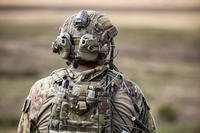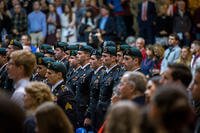African Americans have faced adversity throughout their existence here in America. From the exploitive years of slavery and on through the oppressive years to follow, African Americans have fought dauntlessly to achieve social equality. They have realized, as expressed in the words of Mary McLeod Bethune, that " ... if we accept and acquiesce in the face of discrimination, we accept the responsibility ourselves and allow those responsible to salve their conscience by believing that they have our acceptance and concurrence. We should, therefore, protest openly everything ... that smacks of discrimination or slander." It is, therefore, not a surprise to me that African American soldiers in battle have displayed these same valiant and unwavering efforts.
Brought to America from overseas, it would be back overseas that African Americans could prove to America the truth in the Frederick Douglass quote, "You have seen how a man was made a slave; you shall see how a slave was made a man." In the year 1951 near Chipo-ri, Korea, SGT. Cornelius H Charlton, a Medal of Honor recipient of the U.S. Army, initially met misfortune when his leader was evacuated due to wounds. His courage compelled him to take command and lead his platoon up the hill. Through the use of rifle fire and grenades, Sgt. Charlton's efforts alone eliminated two hostile positions and six enemies. However, ill luck would strike again as his unit was immobilized due to serious losses. This did not stop Sgt. Charlton, as he gathered his men together, only to face intense opposition from the enemy, resulting in his own chest being severely wounded. Unwilling to accept defeat, he denied medical attention in order to rally his men to make a third attempt at reaching the ridge. Sgt. Charlton's final display of bravery and perseverance was when he single-handedly wiped out the remaining emplacement on the reverse slope, although he fell victim to fatal wounds inflicted by a grenade. His story exemplifies the undying efforts of African Americans to succeed and achieve by eliminating walls of obstruction, much like he eliminated the last emplacement retarding the advance of his platoon.
Another example of African Americans' inextinguishable drive to battle oppression was through the sacrificing efforts of then S/Sgt. Webster Anderson, another U.S. Army recipient of the Medal of Honor, during the Vietnam War. In Tam Ky, Republic of Vietnam October 15, 1967, while serving as chief of section in Battery A, Sfc. Webster Anderson took it upon himself to become the defensive stronghold after their defensive perimeter was breached by a North Vietnamese Army infantry unit's hostile attack utilizing heavy mortar, recoilless rifle, rocket propelled grenade and automatic weapon fire. While protecting the battery from his howitzer position, he was knocked down by 2 enemy grenades that exploded at his feet. Refusing to give up, Sfc. Anderson encouraged his men to fight on as he, himself, managed to prop back up into his position to deliver devastating howitzer fire upon the enclosing enemy unit. Sfc Anderson faced even more hardship when he, after noticing an enemy grenade landed in the gun pit near a wounded member of his gun crew, attempted to throw the grenade over the parapet, only to have it explode and wound him even further. Despite his condition, however, Sfc. Anderson refused medical evacuation and continued to motivate his men to success as they held their defensive position and defeated the hostile attack. His bravery would not allow the North Vietnamese Army infantry's oppressive attack to compromise his defensive position, much as African Americans' bravery have defeated attempts to deny their position as equal members of American society.
Booker T. Washington once said, " Success is to be measured not so much by the position that one has reached in life as by the obstacles which he has overcome while trying to succeed." It is these words that have led to the special attention directed towards African American history in this nation. It is not enough to just recognize the awesomeness of the contributions made by African Americans to build and sustain the well being of this country and its allies. America must also acknowledge the hurdled attempts to not eliminate the beauty in each of our differences but to accept and equate them. It is not only during the month of February, but everyday that these attempts are to be recognized, celebrated and commemorated in the hopes that the leaders of this nation will not forget that the ultimate goal has yet to be achieved.















